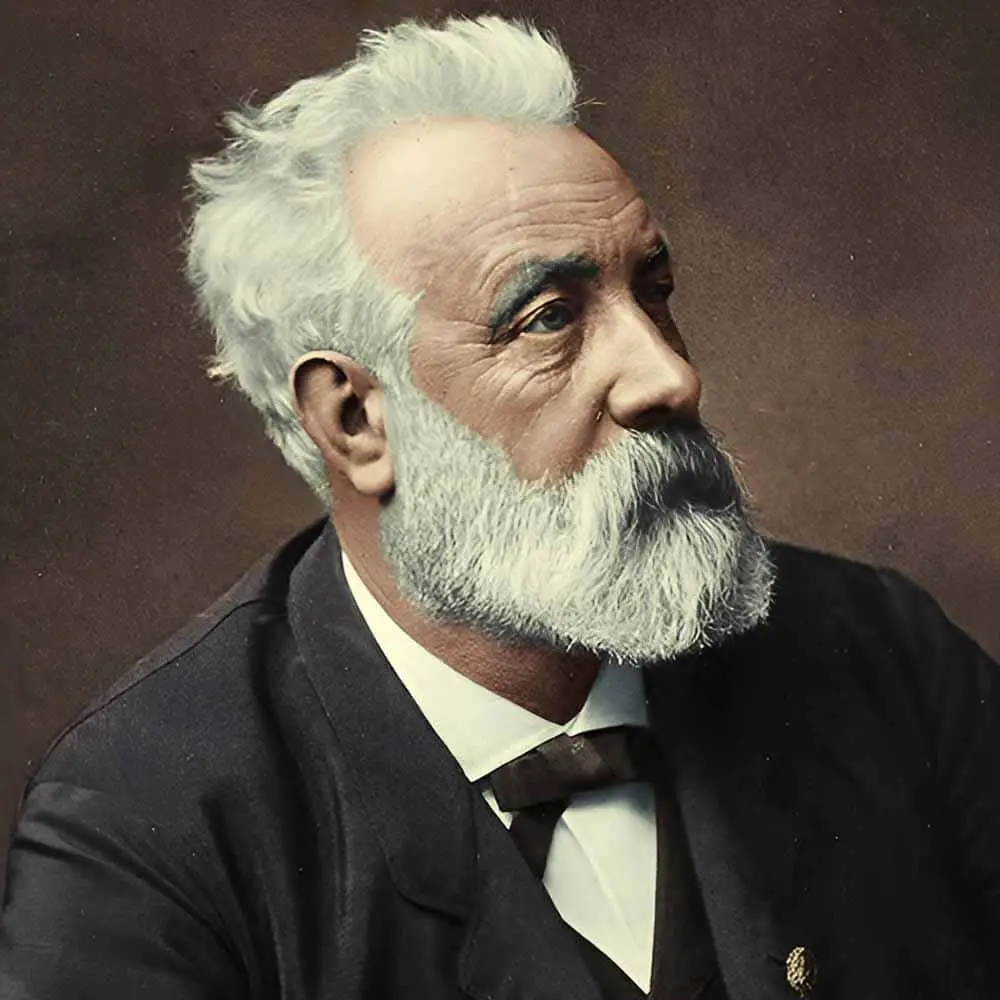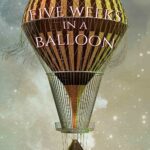
Jules Verne
Born: 8 February 1828
Died: 24 March 1905
Nationality: French
Notable Works: Journey to the Center of the Earth, From the Earth to the Moon, Twenty Thousand Leagues Under the Sea, Around the World in Eighty Days
Full Name: Jules Gabriel Verne
Jules Verne, the French novelist often hailed as the “Father of Science Fiction,” is a literary legend whose works have captivated the minds of readers for generations. Born on February 8, 1828, in Nantes, France, Verne’s vivid imagination and passion for science and exploration laid the foundation for a prolific writing career that revolutionized the genre of science fiction. This article delves into the life and contributions of Jules Verne, exploring his most renowned works, his impact on the literary world, and his timeless legacy that continues to inspire writers, scientists, and dreamers worldwide.
1. Jules Verne Biography
1.1. Early Life and Inspirations
Jules Verne was raised in a middle-class family, with his father as a lawyer and his mother hailing from a family of shipowners and navigators. Growing up near the Nantes shipyards, Verne was exposed to maritime culture and adventure, which left a lasting impression on his creative mind. His fascination with voyages and exploration was further fueled by the tales of his grandfather’s journeys and the maritime stories told by the sailors he encountered.
Despite his passion for writing, Verne pursued a legal education at the insistence of his father. However, his love for literature prevailed, and he began writing plays and short stories, which were eventually published in local magazines. In his early works, the seeds of his literary themes started to emerge, hinting at his obsession with technological advancements and extraordinary journeys.
1.2. Journey to Success
In 1850, Verne moved to Paris, where he met Pierre-Jules Hetzel, a visionary publisher, and editor. Hetzel recognized the potential in Verne’s unique storytelling abilities and encouraged him to focus on science fiction themes. The two struck a lifelong partnership, and Hetzel became Verne’s mentor and collaborator, publishing all his novels under the “Voyages extraordinaires” series. Verne’s unique approach was to blend current geographic and scientific knowledge with thrilling adventure stories, bridging the gap between science and fantasy. This formula proved to be a winning one, resulting in a total of 54 novels in the series.
Verne’s first major success came with the publication of Five Weeks in a Balloon (1863), which introduced readers to his distinctive style, combining scientific realism with captivating adventures. The novel followed the daring journey of three explorers across Africa in a hot-air balloon, capturing the public’s imagination and setting the stage for his subsequent works.
1.3. Masterpieces of Imagination
Jules Verne’s works boast meticulous research, as his “inventions” like the space rocket and submarine were logical extensions of the cutting-edge technology of the 19th century. Verne’s talent for weaving fictional tales with realistic scientific elements allowed him to create an impressive body of work that expanded the horizons of science fiction. Some of his most renowned novels include:
Journey to the Center of the Earth (1864): This timeless classic takes readers on a thrilling expedition to the Earth’s core, where the protagonist, Professor Lidenbrock, and his nephew explore the wonders of a subterranean world filled with prehistoric creatures and geological marvels.
From the Earth to the Moon (1865): An imaginative narrative exploring the ambitious efforts of the Baltimore Gun Club to launch a projectile to the moon, showcasing Verne’s keen interest in space exploration long before it became a reality.
Twenty Thousand Leagues Under the Sea (1870): Arguably Verne’s most famous work, this novel introduces the enigmatic Captain Nemo and his advanced submarine, the Nautilus. The story chronicles the oceanic adventures of a group of explorers as they uncover the mysteries of the deep sea and its inhabitants.
Around the World in Eighty Days (1873): This exhilarating tale follows the eccentric Englishman, Phileas Fogg, as he attempts to circumnavigate the globe in 80 days. The novel brilliantly captures the excitement and challenges of global travel during the 19th century.
1.4. Impact on Science and Society
One of Jules Verne’s most remarkable contributions to literature was his ability to foresee technological advancements and scientific achievements that were far beyond his time. His works were infused with a profound understanding of scientific principles, making him a visionary in the realm of science fiction. Verne’s writings accurately predicted various technological advancements, such as submarines, helicopters, and space travel, inspiring inventors and scientists to turn his fictional ideas into reality.
For instance, his novel From the Earth to the Moon envisioned a spacecraft launched from Florida, remarkably similar to the Apollo missions launched from Cape Canaveral decades later. His work undoubtedly inspired future generations of scientists, including pioneers like Robert Goddard, often regarded as the “father of modern rocketry.”
1.5. Legacy and Influence
Jules Verne’s influence extends beyond the realm of literature. His compelling narratives of exploration and human ambition continue to resonate with readers of all ages, fostering a sense of wonder and curiosity. Moreover, his emphasis on science, exploration, and the potential of human ingenuity has left a profound impact on popular culture and the science fiction genre.
Verne’s works have been adapted into numerous films, television series, and stage productions, cementing their place in modern entertainment. Countless writers, including H.G. Wells and Arthur C. Clarke, have cited Verne as a major source of inspiration for their own works, acknowledging his role in shaping the future of science fiction.
1.6. Conclusion
Jules Verne’s literary legacy is an enduring testament to the power of imagination and the human spirit of exploration. Through his captivating storytelling, he transported readers to uncharted territories and distant worlds, sparking a passion for science, discovery, and adventure. His innovative blend of science and fiction made him a pioneer of the genre, and his visionary ideas continue to inspire generations of dreamers and thinkers worldwide. As long as human curiosity exists, Jules Verne’s extraordinary voyages will continue to ignite our imaginations and remind us of the endless possibilities that lie beyond the boundaries of our reality.
2. Jules Verne Bibliography
2.1. Novels
Five Weeks in a Balloon (1863)
The Adventures of Captain Hatteras (1866)
Journey to the Center of the Earth (1864)
From the Earth to the Moon (1865)
In Search of the Castaways (1867-68)
Twenty Thousand Leagues Under the Sea (1869-70)
Around the Moon (1870)
A Floating City (1871)
The Adventures of Three Englishmen and Three Russians in South Africa (1872)
The Fur Country (1873)
Around the World in Eighty Days (1873)
The Mysterious Island (1874-75)
The Survivors of the Chancellor (1875)
Michael Strogoff (1876)
Off on a Comet (1877)
The Child of the Cavern (1877)
Dick Sand, A Captain at Fifteen (1878)
The Begum’s Fortune (1879)
Tribulations of a Chinaman in China (1879)
The Steam House (1880)
Eight Hundred Leagues on the Amazon (1881)
Godfrey Morgan (1882)
The Green Ray (1882)
Kéraban the Inflexible (1883)
The Vanished Diamond (1884)
The Archipelago on Fire (1884)
Mathias Sandorf (1885)
The Lottery Ticket (1886)
Robur the Conqueror (1886)
North Against South (1887)
The Flight to France (1887)
Two Years’ Vacation (1888)
Family Without a Name (1889)
The Purchase of the North Pole (1889)
César Cascabel (1890)
Mistress Branican (1891)
Carpathian Castle (1892)
Claudius Bombarnac (1893)
Foundling Mick (1893)
Captain Antifer (1894)
Propeller Island (1895)
Facing the Flag (1896)
Clovis Dardentor (1896)
An Antarctic Mystery (1897)
The Mighty Orinoco (1898)
The Will of an Eccentric (1899)
The Castaways of the Flag (1900)
The Village in the Treetops (1901)
The Sea Serpent (1901)
The Kip Brothers (1902)
Travel Scholarships (1903)
A Drama in Livonia (1904)
Master of the World (1904)
Invasion of the Sea (1905)
The Lighthouse at the End of the World (Posthumous, 1905)
The Golden Volcano (Posthumous, 1906)
The Thompson Travel Agency (Posthumous, 1907)
The Chase of the Golden Meteor (Posthumous, 1908)
The Danube Pilot (Posthumous, 1908)
The Survivors of the “Jonathan” (Posthumous, 1909)
The Secret of Wilhelm Storitz (Posthumous, 1910)
The Barsac Mission (Posthumous, 1920)
2.2. Short Stories
A Drama in Mexico (1851)
A Drama in the Air (1851)
Martin Paz (1852)
Master Zacharius (1854)
A Winter Amid the Ice (1855)
The Count of Chanteleine (1864)
The Blockade Runners (1871)
Dr. Ox’s Experiment (1872)
An Ideal Town (1875)
The Mutineers of the Bounty (1879)
Ten Hours Hunting (1881)
Frritt-Flacc (1884)
Gil Braltar (1887)
In the Year 2889 (1891)
Adventures of the Rat Family (1891)
Mr. Re Sharp and Miss Mi Flat (1893)
Pierre-Jean (Posthumous)
The Marriage of Mr. Anselme des Tilleuls (Posthumous)
San Carlos (Posthumous)
The Humbug (Posthumous)
Edom (Posthumous)
Check out free Jules Verne books at PageVio.




